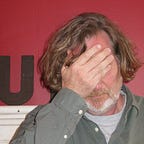RFBC #24: The Other Valley
A debut novel, with a novel twist on time travel
Time travel has been science fiction trope for nearly as long as science fiction has been a thing. (See H.G. Wells, The Time Machine.) Those crazy paradoxes! (See Robert Heinlein, All You Zombies.) The unintended consequences of screwing up the present by alterting the past! (See Ray Bradbury, A Sound of Thunder.) The temptation to kill Baby Hitler! (See…many examples.) It’s been done so often, it’s tough to come up with anything new and different.
Enter Scott Alexander Howard and The Other Valley, a truly different take on time travel. The story takes place in a quirky little town situated between mountains and a big lake, and its inhabitants aren’t allowed to leave without a really good reason—because just over the mountains to the east is an identical town 20 years in the future. To the west is an identical town 20 years in the past.
What’s going on here? Good question—one we explore on the June 2024 edition of Radio Free Book Club. If you don’t want the answer to spoil your fun, you might want to wait until you’ve read the book to read the notes below. And you’ll definitely want to wait to listen to our podcast, which you can find just about anywhere you listen to them.
Show notes:
The RFBC crew for our June 2024 show was Indianapolis writer Ken Honeywell; digital marketing genius and accomplished book summarizer Christine Hudson; father/architect/landlord/philanthropist/go-to science fiction pontificator Craig Von Deylen; and reader/writer/cat mom Jen Bingham. Our show was recorded at Listen Hear in Indianapolis and produced by our friend Galileo for 99.1 WQRT-LP.
A plethora of first names. Scott Alexander Howard—that’s three first names. Does he need all of them? Ken contended he did: He’s Canadian, and Scott Howard is a well-known Canadian curler.
Our biggest point of agreement: We’d never experienced a story like The Other Valley. Kudos to Mr. Three First Names for that.
Is it YA? Both Christine and Ken thought the first half of the book feels like a young adult novel. That changes—kinda?—in the second half.
Speaking of halves: We had very different reactions. Christine felt the first half, featuring 16-year-old Odile, was pretty standard YA. Jen found the whole premise enraging, but felt the story picked up as it went along. Craig mostly agreed with Jen. Ken, on the other hand, was interested in the premise and the world building, but was deeply disappointed that there was never an explanation for the 20-year world bubbles.
Is it science fiction? Good question. The setting appears to be an alternate Earth in some kind of weird spacetime bubble. There are months and seasons and institutions that all smack of Earth of an age not quite as advanced as ours. But there’s no explanation for the central conceit of an identical town to the west where it’s 20 years earlier and another town to the east where it’s 20 years later—and 20 years forward and back in either direction, apparently ad infinitum. Let’s call it “speculative fiction” and leave it at that.
But is it a time travel story? Depends on which of us you asked. Especially for Christine, The Other Valley wasn’t really about time travel; rather, it was about the choices we make and how they affect our past and our future. That seems consistent with Howard’s specialty: According to his Google biography, Howard has a PhD in philosophy from the University of Toronto, where he wrote an award-winning dissertation on literary emotions and the passage of time. On the other hand, Ken thought the story devolved into a typical—and predictable—time travel plot.
No, we would not want to become conseillers—and we didn’t think anyone had a particularly compelling reason to be granted access to the past or the future. And no: none of us really wanted to revisit the past or to see our own futures.
Would we recommend it? And would we watch the TV series that’s apparently already on the way? Craig would definitely watch the series, and would recommend it, especially to younger readers. Jen was a no on the TV series, and would recommend the book, “but maybe not warmly.” Christine would watch the series and ended up loving the book. Ken would watch the series, but only to see how they interpreted the book he wouldn’t recommend.
Bonus recommendations: Christine recommended a novel dealing with time travel in a more traditional way: Blake Crouch’s Dark Matter. Jen, a longtime fan of Frank Herbert’s Dune, recommend both Dune films. Craig, coincidentally, had just finished Dune, and recommended it, along with Isaac Asimov’s Foundation’s Edge. Ken recommended reading and listening to The Summer We Crossed Europe in the Rain: song lyrics written by Kazuo Ishiguro for the American jazz vocalist Stacey Kent, set to music by Kent’s husband Jim Tomlinson, with charming illustrations by Bianca Bagnarelli.
Next month: Our scheduled discussion of the late Alice Munro’s Hateship, Friendship, Courtship, Loveship, Marriage gets derailed by her daughter’s shocking revelations. We’ll try that again another time. Meanwhile, we’ll be discussing James, Percival Everett’s reimagining of Adventures of Huckleberry Finn with Jim as the protagonist. It’s gonna be interesting.
